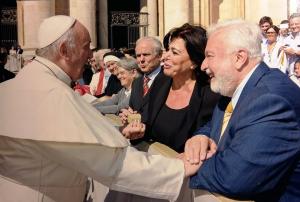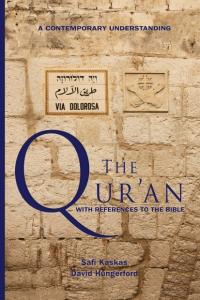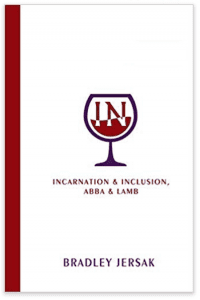Q & R with Brad Jersak – The Quran, Safi Kaskas & Jesus-following Muslims
Question:

I’m a fan of your books. But I saw something on page 142-143 of A More Christlike Way that I’d like to caution you on. I need to advise you that Mr. Kaskas is not being truthful as far as Surah 5:28 is concerned. Verse 28 looks hunky-dory but in verse 29, Abel tells Cain to “Go to hell!” Literally! And the hell Islam represents is the ever-burning Augustinian type.
I would also advise you to Google Taqiyya. Also Kitman. Without knowing about Taqiyya, non-Muslims are liable to believe lies told in the name of Allah.
Also, you wrote as if Allah and the Christians’ God were the same. This is not the case. Look at Surah 4:171; 4:48; 18:4-5; 112:3. Islam is totally anti-Trinity! I was taken in on 9/11 with that deceit.
Response:
Dear Sir,
Thank you for checking in and raising your concerns re: my reference to Mr. Kaskas and his commitment to being a peacemaker. I think that’s a very faith-provoking topic that I welcome engaging. I take your input seriously and want to respond likewise. Some context may help. I hope I can represent my experience and knowledge Safi’s point of view in a respectful and truthful way.

Safi Kaskas with Pope Francis
As you are no doubt aware, there are many streams of Islam that do not agree with each other and in fact, regard each other as heretics of their own faith. These range from the major movements, such as the Shiites versus the Sunnis, but also within these, a great spectrum from violent Islamist extremists to intentional Jesus-following Muslims (and everything between).
That’s no surprise, given that as I write, 1 out of every 5 people on the planet identifies as Muslim. Nearly as broad in their beliefs as you get in Christendom. And in fact, many Muslims would regard themselves as MBNRs—Muslim but not Religious! That is, they see themselves as cultural Muslims who never attend a Mosque, read the Quran or heed the calls to prayer. For them, to be Muslim is simply belonging to the people group and culture into which they were born. I was struck by this while in Istanbul a few years ago, standing between the Blue Mosque and Hagia Sophia when the call to prayer was announced. Although the giant square was full of many 1000s of Muslims, only one solitary Shiite family stopped to pray.
Now as for Safi, he is not only a devout Muslim, but he’s also a follower of Jesus and a Quranic scholar. What does this mean? First, it means he’s a Muslim. He is not a Christian. He is especially not Trinitarian. He does believe Allah sent Jesus to deliver God’s word, that we should study the Gospels and follow the teachings of Jesus. But as a faithful Muslim, he cannot believe in the Deity of Christ or our doctrine of the Trinity. He doesn’t pretend to be a Christian and we have the maturity to honor one another by respecting these key theological differences.
On the other hand, Safi would also say he is a follower of Jesus. Just as not all Christians are real Jesus-followers, not all Jesus-followers are Christians. Islam and Christianity are the religious belief systems to which Safi and I adhere. But Jesus-following is a way of life we both aspire to by God’s grace.
It’s not that doctrine is unimportant. I’ve spent 12 years in theological training because I believe what we think about God radically forms who we are and affects how we live. I pray the Nicene Creed almost daily because Christian orthodoxy is important to me.
So, I’m keenly aware that Safi and I disagree in our Christology. We don’t see the nature of Jesus Christ the same way. At the same time, Safi has proven himself deeply committed to following Jesus in a way that puts many Christians to shame. That is, he purposefully reads and lives the Sermon on the Mount in a way that is enviable. For example, for decades, he’s made every effort to practice Jesus’ call to love our enemies, forgive those who persecute us and pray for those who seek to harm us. Most importantly, he doesn’t do this in theory when it is convenient. He promoted the way of peace described by Jesus in a very public way right after the massacre in New Zealand. He publicly rebuked fellow Muslims who called for violent retaliation at some risk to himself. What a contrast to those Christians who abandon Christ’s call to love and forgive and instead, urge us to take up the hatred and death-dealing that Christ commanded us to leave behind.
This strange state of affairs brings to mind an uncomfortable parable of Jesus:
Matthew 21:28-32 (NIV)
The Parable of the Two Sons
“What do you think? There was a man who had two sons. He went to the first and said, ‘Son, go and work today in the vineyard.’
“‘I will not,’ he answered, but later he changed his mind and went.
“Then the father went to the other son and said the same thing. He answered, ‘I will, sir,’ but he did not go.
“Which of the two did what his father wanted?”
“The first,” they answered.
Jesus said to them, “Truly I tell you, the tax collectors and the prostitutes are entering the kingdom of God ahead of you. For John came to you to show you the way of righteousness, and you did not believe him, but the tax collectors and the prostitutes did. And even after you saw this, you did not repent and believe him.”
The parable is uncomfortable because it raises this question: which brother is the true believer? The one who nods his head in assent but doesn’t live it out … or the one who, despite objections, puts feet to his actions by obedience to Jesus? The first may symbolize someone who believes in Jesus but like the foolish man who built his house on the sand and does not put into practice the Way Jesus prescribed. The true disciple is the one who believes what Jesus taught about forgiveness and prayer and loving our enemies and explicitly follows those directives.
I would add that despite the different responses of the two brothers, the Father nevertheless regards both as sons, just as we see in the parable of the two prodigal sons. So we’re not at all ashamed to call each other “brother.”
All that to say, Safi’s theology is not primarily what draws me. But his willingness to hear and obey Jesus sure does. No, that does not make Safi a Christian. Nor does it earn his salvation any more than I can earn mine. Rather, we both cast ourselves on the mercy of God. The above parable is meant to challenge Christians who claim to follow Jesus but do not. And that was sort of my point.

As Safi interprets the Quran, he reads difficult passages through a specific interpretive lens, just as I do with the Bible. For him, the key to interpreting the Quran is to never take it out of context, but to read it through the opening lines, which he prays many times every day:
“In the name of God, the Merciful-to-all, the Mercy Giver.”
This shapes his reading of the Quran, just as “God is love” shapes my reading of the toxic texts in the Bible. When I go to our Scriptures, I find divine commands to commit genocide—to lay the sword to every man, woman and child, even the infants … and to “show no mercy!” I have learned to read that in historical context and subordinate it to Jesus’ command to love our enemies. So too has Safi with his sacred text. Safi regards his Quran as inspired Scripture, and he shows great regard for the Torah, the Psalms and our Gospels as the sacred texts of “the People of the Book.” He knows to read all these texts with a hermeneutic very like ours—one that says the mercy of God triumphs over judgment. And this is how he reads the Quran’s hell texts, too. So similar to how I read ours.
In any case, I can assure you that Safi Kaskas is never untruthful about what the Quran says. Rather, he translates it and interprets it through his lens of divine mercy.
I am aware of the misinformation floating about the internet concerning Taqiyya, especially by supposedly Christian opponents of peace (an oxymoron, yes?). The word Taqiyya literally means dissimulation: I.e. “Concealing or disguising one’s beliefs, convictions, ideas, feelings, opinions, and/or strategies at a time of imminent danger, whether now or later in time, to save oneself from physical and/or mental injury.”
Now I would bet there are Muslim extremists who contort this meaning for nefarious purposes—the same types who use the Quran to justify violence against “unbelievers.” But of course, those Islamists ignore the fact the Quran identifies “unbelievers” as not Jews or Christians! And they ignore the Quran’s clear directives that this violence cannot be initiated but only enacted under strict rules of self-defense while under attack. To ignore this for them is to abandon the intentions of Mohammed (PBUH) just as it is when Christians abandon the Jesus Way of radical forgiveness. In other words, the Islamists twist the Quran’s meaning from a kind of “just war theory” (nearly identical to St. Augustine’s) into their own version of the crusades.
It’s not for me to justify or critique the Quran’s “just war theory.” But I certainly don’t align myself with the “Christian” version I see in St. Augustine (not that anyone follows it anyway). My intent is to worship the Prince of Peace in practice, not just in my hymns. But we know that there are many Muslims and Christians who can be described as war-mongers rather than as peacemakers. But I’ve chosen to be a peacemaker. And so has Safi.
You raised a very good question: do Muslims and Christians worship the same God? That is a complex question worth pondering. On the one hand, Safi and I agree: there is only one God. There aren’t two gods or three gods or three hundred Gods. When anyone calls on God, either that God hears or no one does, because there are no other gods.
But we also understand that one God differently. As a Christian, I believe the one God is Triune, revealed as Father, Son and Holy Spirit. As a Muslim, Safi cannot accept our doctrine of the Trinity, especially given the sloppy Tritheism so rampant across Christianity.
As a Christian, I believe that one God was revealed through Jesus Christ. I regard Jesus of Nazareth as God Incarnate. Safi cannot. I think he would say that God was revealed through Jesus, but as a prophet of God and certainly not as God’s divine Son.
These are central non-negotiable differences in how we view the one God … but I believe we are both doing the best we can to reflect on that one God, not two different Gods.
Second, we both believe that the God proclaimed by Jesus Christ is the same God to whom Abraham prayed. Yet Safi would not agree that Abraham’s God is one and the same Lord who said, “Before Abraham was, I AM.” So, does that mean we worship two different Gods of Abraham?
Well, let’s think about the first-century Jewish rabbi, Saul of Tarsus, who unlike Safi, rejected Jesus Christ altogether. When Saul prayed to the God of Abraham in the Jewish Temple, to whom was he praying? Since he was not a Christian, could God no longer hear him? As an unconverted Pharisee, he did not believe that God was triune or that Christ was divine, so were his prayers now directed to a different god?
I’m more optimistic than that. I think Saul’s real problem was that in his rather violent devotion to the one true God, his understanding of that God was brutally (literally) mistaken. And yet with all his misunderstandings of God, he surely prayed to the God of Abraham. And was it not the God of Abraham who heard and honored those prayers by eventually introducing him to Jesus. So too with Jews today. I think that belief in YHWH but rejection of Yeshua is a tragic mistake. But in Romans 9-11, Paul foresees a very good end, even for his countrymen who’d spurned his gospel. He believed in God’s plan to reveal Christ to them one day.
I have a similar optimism for my Muslim friends. They pray to the God of Abraham, even though they understand him so differently than I. They cannot accept that God is triune (just like most good Jews) or that Christ is divine (just like most Jews). But they call out to the God of Abraham and unlike Saul (at first), they honor the name of Jesus. My belief is that God has heard those prayers and honors them by revealing Jesus to them, even if it’s not exactly how I see him.
I pray that more Muslims and Christians would meet Jesus for themselves and choose to follow him in the Jesus Way of peace. I know Safi has. I rejoice in our common ground as to the crucial importance of Jesus’s life and teaching. We agree that Jesus was born of the virgin Mary, that he is alive and will come again to establish God’s kingdom on earth. It says so in the Quran! That’s a good start as we ask, “Do we worship the same God?”

So, when you say the Quran is anti-Trinity, absolutely. There is no doubt. If you say that the Quran does not teach Jesus is God, absolutely. There is no doubt. Safi’s translations make no bones about that. He is a Muslim, not a Christian. And in fact, his interpretation of the Quran has also been critiqued by other Muslims. But this I know: his interpretation leads him to say that we must follow Jesus when he says, “Blessed are the peacemakers. They will be called the children of God.” … And while Safi’s understanding of God is radically different than mine, I find in him a “man of peace” who loves Jesus. And so, I obey Jesus when he says, “If a man of peace is there, your peace will rest on him; but if not, it will return to you.” (Luke 10:6).
The bigger question is not really an examination of Safi’s faith, but of yours and mine. Are we living as peacemakers? Am I the wise men who build his house on the rock by hearing Jesus’ words and following them? Are we loving our enemies and praying for them and blessing them? Well, I must say for myself the answer is “not usually,” which is why I also pray, “Lord, have mercy.” I pray that the grace of the Holy Spirit would transform me into a “man of peace.”
Again, thank you for your faith-stimulating question. It does help me to articulate what I meant but could only say in a few paragraphs in the book—that if God is love, then God calls us to extend that love to others, and to receive it from those who extend it to us.
As a small-c conservative, I’m aware that for many of my fellow conservatives, fear and trauma since 9-11 have made it difficult to relate to Muslims in Christlike ways. But the deeper truths that we must take pains to conserve are the teachings of Jesus Christ on God’s love for all, even in a chaotic and violent world. Safi Kaskas is my friend and my brother. But if he were my enemy, I would know exactly what to do because it’s there in red letters of Jesus: love, pray and bless. Not all Muslims are like Safi, but I gladly cited him because we trust each other’s hearts.
God’s peace,
Brad
P.S. As a little bonus, I will leave you with this commentary on Matthew 5:9, written by Safi especially for his Muslim readers:
If we Muslims want to live with our Christian neighbors, we need to know what their Book teaches them.
In the Gospel according to Matthew, Jesus said:
“Blessed are the peacemakers, for they will be called children of God” (Matthew 5:9).
Peacemakers are those special individuals who care enough to strive for peace. They leave everything in order to resolve other people’s conflicts. Jesus is putting emphasis here on the importance of getting believers engaged in conflict resolution.
Among our Christian brothers and sisters, the primary conflict they will think about is what they call the alienation of human beings from God and they consider that Jesus’ main mission was to reconcile us back to God.
Jesus says in Matthew 5:9 that people who have become peacemakers have some of the characteristics of their heavenly Father. We know from Scripture that the heavenly Father is a “God of peace” (Romans 16:20; 1 Thessalonians 5:23; Hebrews 13:20), that heaven is a world of peace (Luke 19:38), and most important of all, that God is a peacemaker (2 Corinthians 5:19; Colossians 1:20).
A true understanding of Jesus’ teachings will turn every true Jesus-follower into a peacemaker.
Muslims see the main conflict as one of submitting and seeking harmony with God’s will. The Arabic word Islam is derived from the same root salam and has the same connotation as the Hebrew word shalom. The best definition of the word Islam is to establish and promote inner and outer peace, in harmony with the will of God.
But along with the calls for peace in the name Islam, as well as in references to God as Al-Salaam, the source of all peace, Islam’s religious text, the Quran, also references the importance of peaceful living and coexistence for the entire human community.
“Enlightenment has now come to you from God and a clear Book.” (5:15) “Through it, God guides those who follow what pleases Him to ways of peace and by His permission, He will bring them out from the darkness of ignorance into enlightenment and will guide them to a straight path” (Q 5:16).
A Muslim who understands his/her faith will always be a peacemaker.




 Plain Truth Ministries | Box 300 | Pasadena, CA 91129-0300
Plain Truth Ministries | Box 300 | Pasadena, CA 91129-0300
